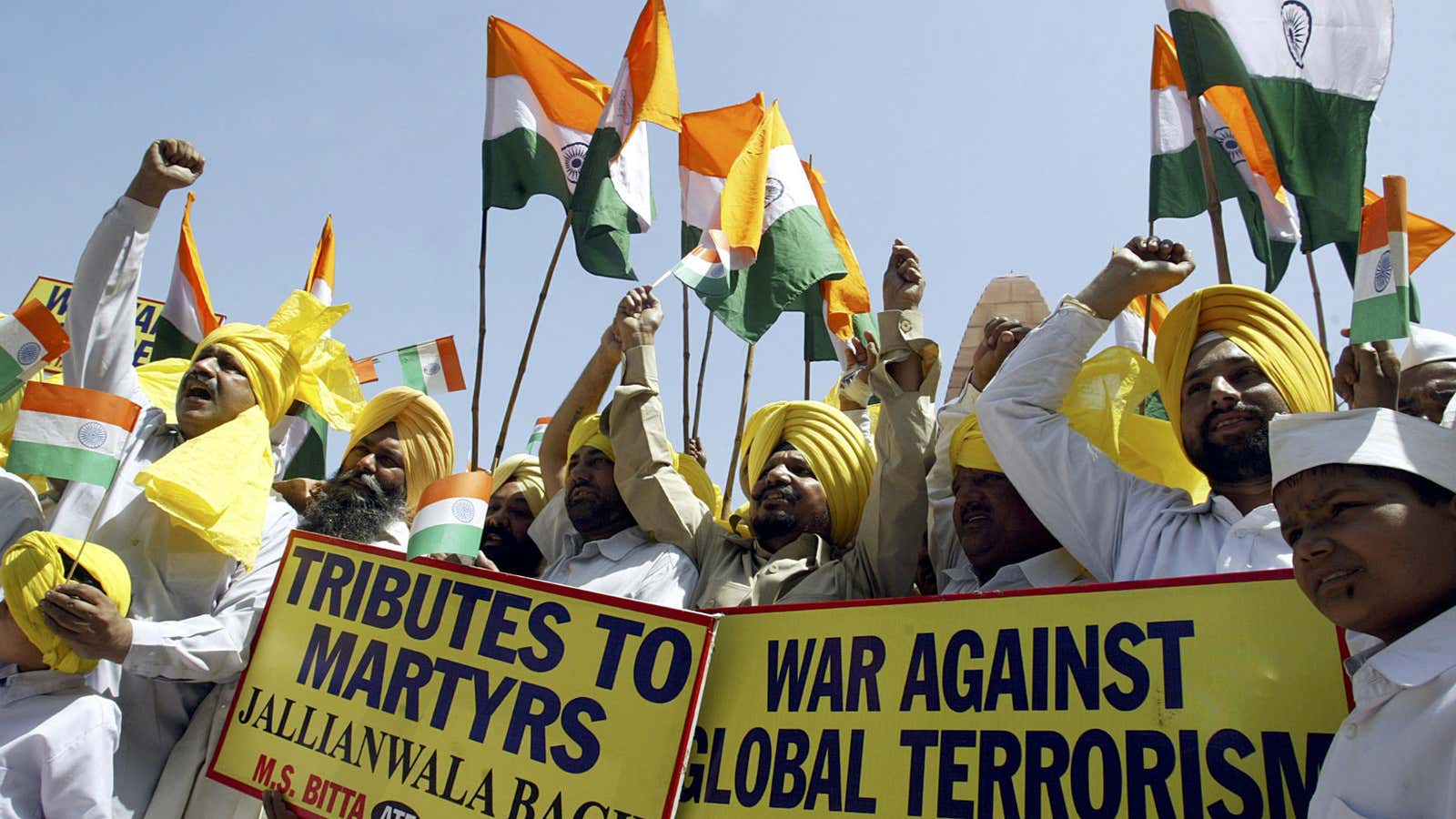British prime minister Theresa May yesterday (April 10) expressed “deep regret” for a colonial era massacre carried out exactly 100 years ago in the north Indian state of Punjab.
May’s statement in the House of Commons, however, fell short of a full apology for the events of April 13, 1919, when British Indian Army troops led by Colonel Reginald Dyer opened fire on civilians at Jallianwala Bagh in the city of Amritsar. The crime near Sikhism’s holiest shrine, the Golden Temple, left hundreds dead and over 1,200 injured.
“The tragedy of Jallianwala Bagh of 1919 is a shameful scar on British Indian history. As Queen (Elizabeth II) said…in 1997, it is a distressing example of our past history with India,” May said.
In the centenary year of the massacre, a section of Indian-origin British parliamentarians have been pushing the UK government to issue a formal apology.
“It is clear that there needs to be a formal apology from the United Kingdom government that accepts and acknowledges their part in the massacre,” Preet Kaur Gill of the opposition Labour Party said during the debate in the House of Commons. “This is the right time for the prime minister to publicly apologise,” added Virendra Sharma, her fellow member of parliament and party colleague.
Yet, such hopes may not lead to any change in stance before the centenary anniversary of the Jallianwala Bagh massacre this Saturday, being marked across Britain. During the debate in parliament, the UK foreign office minister, Mark Field, pointed to the “financial implications of making an apology.”
May’s statement, too, merely echoes similar sentiments expressed by her predecessors. During a visit to Punjab in February 2013, the then British prime minister David Cameron described the bloodbath as a “deeply shameful event in British history.”
At the time, many had pointed to Cameron’s double standards. In 2010, the Conservative Party leader had tendered an apology for the excesses of British troops on “Bloody Sunday” (1972) in Northern Ireland. Again, in 2013, Cameron admitted his country’s accountability in the Mau Mau uprising in Kenya in the 1950s.
The colonial excess perpetrated in India, still being remembered a century later is testimony to the fact that it was among history’s great tragedies.
How it unfolded
April 13, 1919 in Punjab was Baisakhi day, the spring festival that marks the new year. The weeks preceding were tumultuous as many had heeded the call by leaders of the Indian freedom struggle to protest the Rowlatt Act, passed a month earlier.
The law suspended civil liberties and allowed for trial of political prisoners without a jury. The Act was recommended by the Justice Rowlatt committee following an inquiry into alleged revolutionary conspiracies in India. Protests against the Act had led to the arrest of Independence leaders and thousands had gathered at Jallianwala Bagh (a walled garden) on Baisakhi to express their resentment.
At the time, Colonel Dyer, who was charged with maintaining law and order in the city by the Lieutenant Governor Michael O’Dwyer, had imposed a curfew.
On the fateful day, Dyer’s troops arrived at Jallianwala Bagh and, after sealing the main exit, fired 1,650 rounds at the unarmed protesters—men, women, and children—for 10 minutes without warning. The firing stopped only when the troops ran out of ammunition. Official estimates place the number of dead at 379, while the real numbers were said to be three times that.
Despite the national upheaval following the incident, Dyer’s actions were endorsed by O’Dwyer, who, some historians say, was the brain behind the massacre.
While Dyer died a natural death in 1927, O’Dwyer was shot and killed in London by the Indian revolutionary Udham Singh in 1940. Singh was among the survivors of the massacre. Convicted and sentenced to death, he was hanged on July 31, 1940, in Britain.
Aftermath
It has been said that Britain’s grip over India began to loosen after the Jallianwala Bagh massacre. It gave a new shape and sense of urgency to the Independence movement.
Pressure from around the world and within India, forced the British to set up a court of inquiry against Dyer. The court merely relieved him of his command and forced him to resign.
“General Dyer was vigorously defended by—I say this with shame—the Conservative Party, as well as most of the military establishment. He evaded any penalties post inquiry, as his military superiors advised that they could find no fault with his actions, his orders, or his conduct otherwise,” said Bob Blackman the Conservative Party MP who opened the debate in the House of Commons on Wednesday.
The massacre remains an emotive issue in Punjab to this day. The state assembly had in February this year unanimously passed a resolution to urge the central government to seek a formal apology from the British for the massacre.
Pending an apology, it is clear why even a 100 years is not enough for the scars of history to fade.
